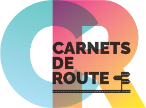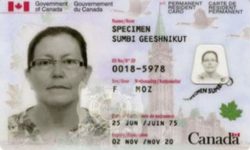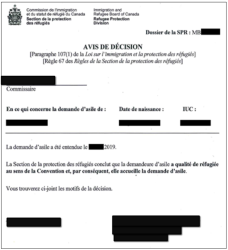The content of this section of Carnets de route was updated in March 2025. Some elements may have changed since then. If in doubt, consult the sources and resources in this section. You can also report any information that needs to be changed through Technical Support. Update dates may vary by section.
Carnets de route contains information specifically aimed at refugees and refugee claimants, as well as the people assisting them. Carnets de route is intended to help you with the process of settling in when you arrive and during your first few years in Québec.
With Carnets de route, you will enjoy an engaging experience: reliable, organized and accessible information about Québec society, steps to take, to-do lists, timelines, summary diagrams and much more!
Select whether you would like to view the website in English or French, then answer the following three questions to be directed to the right information.
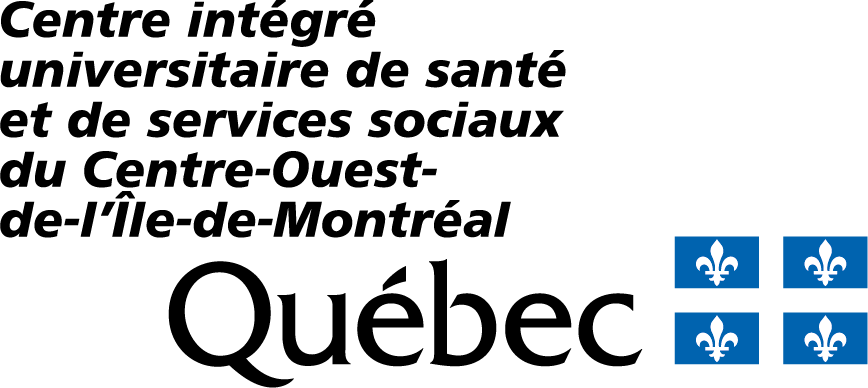
Your profile
Refugee Claims
Accepted Refugee Claims
Refused Refugee Claims
Refugees
Read This Information First
Updates – Read this information first
1. Who does what?
“Don’t be afraid to seek help from these organizations. For me, the first enemy is fear and being isolated.” – Idrissou
1.1 People and organizations here to support you
(CIUSSSCentre intégré universitaire de santé et de services sociaux du Centre-Ouest-de-l’île-de-Montréal, 2023; Cleveland, Hanley, Salamanca Cardona, et al., 2021; Gouvernement du Québec, 2023ag, 2023g; IRCCImmigration, Refugees and Citizenship Canada , 2023o; Jobin-Théberge & Bombardier, 2020b, 2021; SANA Trois-Rivières, 2023; TCRITable de concertation des organismes au service des personnes réfugiées et immigrantes , 2021; Trosseille et al., 2019)
Community organizations
- Community organizations offer services that are generally free to the public.
- Some organizations specifically help people who have just arrived in Québec. Others offer services for specific needs, such as employment, education, etc.
Your host organization is a community organization tasked by the Government of Québec with helping you with every part of the process of settling in (for example, finding housing and looking for a job), especially during your first year in Québec.
Limits of what community organizations can do
- The counsellor helping you may not speak your language or be familiar with your culture. The counsellor will do their best to communicate with you despite these challenges.
Counsellors are not responsible for:
- Delays, including with the immigration or family reunification process
- Lending or giving you money other than the financial assistance to which you are entitled
- Assisting you with all your decisions. Counsellors cannot be on call at all times and cannot make decisions on your behalf.
“The workshops given by social workers were useful for me. The more you know, the further you can go.” – Banji
The counsellor you started working with may also leave the organization. Don’t be discouraged; you will get another counsellor as soon as possible.
CLSCLocal community service centre
CLSCLocal community service centre offer physical and mental health services, as well as social services.
Finding a CLSCLocal community service centre – Government of Québec
Religious communities
Many religious communities offer support to refugees refugee claimants.
1.2 Other important organizations
(ASFC, 2023; CISR, 2022g; Gouvernement du Québec, 2023r; IRCCImmigration, Refugees and Citizenship Canada , 2023p)
2. Declaring children
You must declare all your children and other family members on all the forms you complete. Otherwise, it will be very difficult to reunite in Canada in the future. The number of children you declare will not affect your immigration process.
3. Change of address and contact information
3.1 Change of address
(Agence du revenu du Canada, 2023b; CISR, 2023; Collectif Bienvenue, 2023f; Conseil canadien pour les réfugiés, 2023b; Emploi et Développement social Canada, 2025; Énergir, 2023; Gouvernement du Québec, 2023e; Hydro-Québec, s.d.; IRCCImmigration, Refugees and Citizenship Canada , 2023j, 2024; Ministère de l’Emploi et de la Solidarité sociale, 2021; Revenu Québec, s. d.-d; Service québécois de changement d’adresse, 2022; Société de l’assurance automobile du Québec, 2023a)
If you move, it is extremely important to notify the following authorities of your change of address:
3.1.1 Québec institutions
- Hydro-Québec :
By phone
1-888-385-7252 (A fee will be charged to change an address by phone)
- Énergir
Online
By phone
1-800-875-9354
- MIFIMinistère de l’Immigration, de la Francisation et de l’Intégration (du Québec) :
Online
Via the Arrima platform: Arrima – Online immigration and French learning services | Government of Québec
By phone
1-877-864-9191
- Other Québec ministries and organizations: How to send your new address to the government when you move
3.1.2 Canadian institutions
- Canada Revenue Agency:
By phone
1-800-959-8281
By mail
Complete the form RC325, Address and Telephone Number Change Request and mail it to the address indicated on the form.
- Service Canada :
By phone
To ask for an agent to call you: Service Request Form – Government of Canada
If you prefer to call yourself, the phone number depends on the services you are receiving (for example, employment insurance).
To find the phone number for each service, visit this webpage: Change your personal information
In person
Visit your nearest Service Canada centre: Service Canada offices in Québec
- Other Canadian ministries and organizations: Change of address – Canada.ca
3.1.3 Other
- Your financial institution (bank or credit union)
- Your host organization or sponsorship group
- The PRAIDAProgramme régional d’accueil et d’intégration des demandeurs d’asile (English: Regional Program for the Settlement and Integration of Refugee Claimants) : 514-484-7878, extension 64500
If you do not change your address, this may have a negative impact on your refugee claim and on your administrative procedures.
3.2 Change of contact information
Many government authorities communicate by email and sometimes by phone. It is important to notify them of a change of email and/or phone number to avoid any processes being suspended.
- Notify the same authorities as for changes of address.
- Look into email forwarding options.
3.3 Mail forwarding
(Postes Canada, s. d.)
To keep getting mail from your old address at your new one, you can apply for mail forwarding with Canada Post (fee-based service):
Mail forwarding by Canada Post
This way, mail sent by mistake to your old address will be redirected to your new address.
4. Confidentiality
(Éducaloi, 2023h, 2023e; Services juridiques de Pointe-Saint-Charles et Petite-Bourgogne, 2017)
In Québec, personal information is kept confidential. This means that the people at the organizations you interact with cannot share any information you give them unless they have your permission to do so.
For years, health professionals (for example, social workers, nurses and psychologists) and lawyers have had a legal duty of confidentiality. This duty also applies to all employees of the health and social services network. In 2022, a new law came into effect to reinforce public organizations’ duty to keep your personal information confidential.
Specifically, this duty of confidentiality means that the people you interact with must not share your name, contact information or other personal information with the CBSACanada Border Services Agency , IRCCImmigration, Refugees and Citizenship Canada or IRBImmigration and Refugee Board of Canada unless they have your permission to do so.
When you interact with professionals, counsellors or volunteers, you can remind them that your personal information can only be shared with your permission.
The professionals who work with you must also uphold your confidentiality and are not required to reveal your sexual identity to your family or anyone else without your permission. If this applies to you, you can request that your personal information only be shared with your permission.
5. Access to a lawyer and other legal resources
(Cleveland, Hanley, Salamanca Cardona, et al., 2021; Collectif Bienvenue, 2023b; Jobin-Théberge & Richard, 2020b; Kinbrace Community Society, 2019, 2023g; Services juridiques de Pointe-Saint-Charles et Petite-Bourgogne, 2017; Trosseille et al., 2019)
You may need legal advice to guide you through some of the steps you need to take, for example for your refugee claim, a marital separation, reuniting with your family members in Canada, etc.
5.1 Legal aid
(Commission des services juridiques, s. d.)
You may be eligible for legal aid if you are receiving social assistance or have a low income. Legal aid gives you access to free or fee-based services from:
- A private lawyer or notary who takes legal aid cases whom you find on your own (most common scenario)
OR
- A lawyer from a legal aid office
Legal aid covers things like the cost of translating documents, including evidence.
Contact your nearest legal aid office to make an appointment.
Find a legal aid office – Commission des services juridiques
Find an immigration legal aid office – Legal Aid Montréal | Laval
The first appointment determines whether you are eligible for legal aid. You will need to provide proof of income.
Many processes are not covered by legal aid, such as family reunification.
If you are not eligible for legal aid, you will have to pay for your lawyer yourself.
5.2 Lawyers
Lawyers can represent you at your hearing or when you appear in court. They can also help you go through complex procedures, such as for your refugee claim or bringing your family to Canada through certain programs.
Find a lawyer – Barreau du Québec
To find a lawyer and/or check they have the right to practise
Find an immigration lawyer – AQAADIAssociation québécoise des avocats et avocates en droit de l’immigration (Québec Immigration Lawyers Association)
To find an immigration lawyer and/or check they have the right to practise
Watch out for scams. Make sure your lawyer has the right to practise by looking them up in these directories.
5.3 Immigration consultants
Immigration consultants play a role similar to that of immigration lawyers: they can help you with complex procedures, for example reuniting with your family in Canada through certain programs or assisting you with your refugee claim.
The services of an immigration consultant are not covered by legal aid. There are also certain limits as to what an immigration consultant can do.
Find an Immigration Consultant – College of Immigration and Citizenship Consultants
To find an immigration consultant and/or check they have the right to practise.
Make sure your consultant has a “Class L-3 RCIC-IRBImmigration and Refugee Board of Canada ” licence so they can represent you before the IRBImmigration and Refugee Board of Canada .
Find an immigration consultant – Québec Register of Immigration Consultants
To find an immigration consultant and/or check they have the right to practise
Watch out for scams. Make sure your consultant has the right to practise by looking them up in this register.
5.4 Precautions
- Beware of scammers who pretend to be lawyers and disappear once they have been paid. Check that your lawyer or consultant has a right to practise by looking up their name, address, email and phone number in the directories mentioned above.
- Be wary if:
- The lawyer does not have you sign a service contract or confidentiality agreement. The contract must also be signed by the lawyer. Do not sign documents you don’t understand or blank documents.
- The lawyer asks to be paid in cash only, does not give you an invoice or asks for your banking information.
- The lawyer asks for more money to offer a better service or threatens or blackmails you in any way.
- The lawyer claims to have high-ranking contacts, guarantees that your application will be given priority and that you will be accepted as a refugee.
- The lawyer promises to find you housing and a job.
- The lawyer encourages you to lie and use false documents in your claim.
- The lawyer meets you in a public place.
- The lawyer has contacted you via social networks.
- If someone who is not a lawyer or immigration consultant offers you help, it must be completely free of charge.
Fauxavocat.ca (Fake Lawyers) – Barreau de Montréal
Anonymous and confidential
Whistleblowing against fake lawyers can be done in the language of your choice, and the process is confidential. What’s more, whistleblowing can be anonymous, and a counsellor or another person can make the report for you.
Other advice concerning lawyers who are members of the Barreau du Québec:
- Some lawyers may try to charge you high fees for simple tasks such as applying for social assistance or changing your address. A number of community organizations can help you with this process free of charge.
- Always be pay attention to the deadlines for your refugee claim and check the work done by your lawyer.
- Ask for copies of all the documents submitted for your refugee claims.
- Never give your original documents to your lawyer. Give them copies.
“It’s important to know that you can get a new lawyer if things aren’t working out with your current one.” – Idrissou
You can file a complaint if you have a bad experience with a lawyer or immigration consultant:
- For complaints concerning lawyers, visit: How to file a complaint against a lawyer
Complaints against real lawyers can be anonymous, and a counsellor or another person can make the complaint for you. If in doubt, contact the Barreau du Québec at 1-844-954-3411.
- For complaints concerning immigration consultants, visit: Make a Complaint
5.5 Community legal clinics/Legal information clinics
Finding an immigration lawyer or consultant can be difficult and expensive. Community legal clinics provide access to low-cost legal advice and representation in court. These clinics can also refer you to a lawyer.
Some clinics may be able to help you if your refugee claim has been refused or if you want bring your family to Canada.
Legal information clinics are also resources to help you, at little or no cost. Theses clinics cannot provide legal advice or represent you. They can help you understand your legal situation. For example, they can inform you about the recourses and rights provided by law.
Community legal clinics – The Welcome Guide – Welcome Collective
Legal services – The Refugee Centre
Just Solutions Legal Clinic
Greater Montréal – Community legal clinic
Find a community legal centre – Commission des services juridiques
The Legal Collective
Greater Montréal – Community legal clinic
Immigration Law Information Centre in Parc-Extension
Centre to obtain legal information, but not legal advice. For example, they can explain what is possible under the law but cannot advise you on the best course of action.
5.6 Community justice centres
(Centres de justice de proximité, 2023)
Community justice centres are found in many regions of Québec. These centres offer legal information, support and guidance, particularly for couples who are separating.
Find a community justice centre
6. Fraud
(ASFC, 2022a; Cleveland, Hanley, Salamanca Cardona, et al., 2021; IRCCImmigration, Refugees and Citizenship Canada , 2023q, 2023ac; Kinbrace Community Society, 2023g)
6.1 Phone and email scams
Beware of phone and email scams. Watch out for:
- Phone calls, including robocalls, claiming to represent the government and asking you for money. The CBSACanada Border Services Agency , IRBImmigration and Refugee Board of Canada and IRCCImmigration, Refugees and Citizenship Canada will never ask you for money over the phone.
- Emails or text messages asking you to click on links. These links could have viruses.
- Scammers telling you that you have won money or trips.
If in doubt, check with the OPCOffice de la protection du consommateur or someone you know and trust.
6.1.1 For more information
Office de la protection du consommateur
If you have experienced fraud or for information
6.2 SINSocial insurance number
Be careful who you share your SINSocial insurance number or banking information with and make sure it is not a scam. Reliable institutions never ask for this information by email or text message.
You will generally need to share your SINSocial insurance number and banking information with your employer.
6.3 Bribes
In Québec, offering bribes to people in positions of authority is not allowed. For example, never offer money to a police officer or immigration officer to bribe them. This will only make your situation worse.
Don’t lie or withhold information from the government either. You risk being penalized for doing so.
“In some countries, people tend not to declare everything, knowing that the system won’t notice. But things are different in Canada: if you lie, the government will find out. It’s important for newcomers to know this, because this can save you a lot of trouble.” – Walter
7. Interpreters
(CISR, 2021c; CIUSSSCentre intégré universitaire de santé et de services sociaux de la Capitale-Nationale, 2023; CIUSSSCentre intégré universitaire de santé et de services sociaux du Centre-Sud-de-l’Île-de-Montréal, 2020; Gouvernement du Québec, 2023af; IRCCImmigration, Refugees and Citizenship Canada , 2022d; Kinbrace Community Society, 2023h)
You can receive some services in your first language if interpreters are available. Many community counsellors who work with newcomers speak multiple languages and can help you get interpreter services.
In some situations, you can request assistance from an interpreter. Specifically:
- For your refugee claim hearing, the IRBImmigration and Refugee Board of Canada is required to provide you with an interpreter free of charge if you request one on a form to be sent at least 10 days before the hearing.
- If you are arrested or detained, the police must tell you the reasons you are being arrested or detained in a language you understand.
- If you are charged with a crime, you have the right to assistance from an interpreter free of charge if you do not understand the language of the trial.
- In other cases, you can ask for an interpreter, but organizations are generally not required to provide one.
If possible, let them know in advance that you would like an interpreter.
During your first year in Québec, your sponsorship group or host organization will help you get access to an interpreter. It can be difficult to get access to interpreters.
7.1 Getting represented
If you have trouble speaking English or French, you can agree to have a relative, counsellor or lawyer contact some services (IRCCImmigration, Refugees and Citizenship Canada , the MIFIMinistère de l’Immigration, de la Francisation et de l’Intégration (du Québec) , an educational institution, etc.) on your behalf.
To have a representative recognized by:
- IRCCImmigration, Refugees and Citizenship Canada : Use of a Representative – IRCC
- MIFIMinistère de l’Immigration, de la Francisation et de l’Intégration (du Québec) : Get represented in your immigration procedures | Government of Québec
7.2 Translation resources
Please note that the accuracy of these online translation platforms is not guaranteed.
Tarjimly
A mobile app that lets you interact with a volunteer interpreter online
Google Translate
iTranslate
8. Certified translations
(Gouvernement du Québec, 2023ad; Justice Québec, 2021a)
For many immigration procedures, you must provide certified translations of any documents not in English or French, as required, either by:
- A certified translator (sometimes mandatory)
Ordre des traducteurs, terminologues et interprètes agréés du Québec
- Someone you know (often possible and less expensive) who speaks French or English and the original language of the document. A sworn affidavit must be included. An affidavit is a sworn statement explaining that the person speaks both languages and has translated the document to the best of their ability.
If you need to get an affidavit or copies of original documents sworn, this can be done with:
- A lawyer. To find a lawyer, see Access to a lawyer and other legal resources
- A notary
Find a notary – Chambre des notaires du Québec
- A commissioner for oaths
Find a commissioner for oaths – Justice Québec
Find out about the type of translation and certification required for each situation. Ask your host organization or sponsorship group for help with this.
Translating Documents – The Welcome Guide – Welcome Collective
Greater Montréal – Organizations and individuals that can translate documents
9. Mailing documents
When sending important documents by mail, use registered mail (fee-based service). This lets you to keep track of your mail. To find out more: Registered Mail | Personal | Canada Post
There are post offices at some pharmacies and shopping centres.
Find a Post Office – Canada Post
10. Calls from and to service organizations
11. Driver’s licence
(Collectif Bienvenue, 2023g; MIFIMinistère de l’Immigration, de la Francisation et de l’Intégration (du Québec) , 2023; Paquet, Josée, 2015; Société de l’assurance automobile du Québec, 2023c; Ville de Sherbrooke, 2023f)
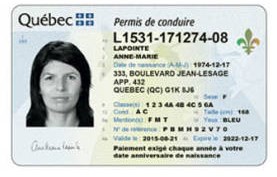
To keep your Québec driver’s licence valid, you will have to pay an annual fee on your birthday. Every four or eight years, your licence will be changed with a new and up-to-date photo.
11.1 If you have a foreign driver’s licence
(Société de l’assurance automobile du Québec, 2024)
For your first six months in Québec
You can drive with your foreign licence (obtained in a country other than Canada). If your licence is in a language other than English or French, have it translated and certified.
After six months in Québec
You must drive with an international licence or get a Québec licence.
Make an appointment for your driver’s licence – SAAQSociété de l’assurance automobile du Québec
There may be an agreement between the country where your licence was issued and Québec. If this is the case, you will need to make an appointment with the SAAQSociété de l’assurance automobile du Québec , bring documentation and pay a fee. You will not have to take any exams. For a list of eligible countries: Canadian or foreign driver’s licence – SAAQ
11.1.1 Steps to follow
- Visit the Société de l’assurance automobile du Québec (SAAQSociété de l’assurance automobile du Québec ) website to make an appointment: Canadian or foreign driver’s licence – SAAQ
- Prepare for the tests by reading the instructions and by using the resources available online: Newcomers- Prepare for the tests
- Bring the necessary documents: your foreign driver’s licence (translated into French or English, if needed), proof of residence and an immigration document as proof of identity.
- Pass the SAAQSociété de l’assurance automobile du Québec
knowledge test at the appointment (available in five languages: French, English, Spanish, Arabic and Mandarin, or through an interpreter).
- Make an appointment for the road test.
- Pass the SAAQSociété de l’assurance automobile du Québec
road test.
- Pay the fees.
Ask your host organization or sponsorship group to help you with this process. Please note that no one can accompany you on the road test.
It is important to plan your return journey in case you fail your road test. For example, ask someone with a valid driver’s licence to accompany you back home.
If you fail your road test, you will no longer be allowed to drive with your foreign driver’s licence, even if you have been in Québec less than six months. You will receive a learner’s licence with new conditions to respect in order to drive.
It may take several months for you to get an appointment at an SAAQSociété de l’assurance automobile du Québec point of service. Schedule one as soon as possible.
11.2 Getting your licence for the first time
(Société de l’assurance automobile du Québec, 2023b)
If you have never had a driver’s licence or have less than a year of driving experience (including the first six months in Québec), you will need to go through the regular process to obtain one.
For more information about getting your first driver’s licence: Obtaining a driver’s licence
11.2.1 Steps to follow
- Take theoretical and practical courses at a driving school recognized by the SAAQSociété de l’assurance automobile du Québec : Finding a recognized driving school – SAAQ
- Pass the knowledge test at a driving school recognized by the SAAQSociété de l’assurance automobile du Québec .
- Obtain your learner’s permit.
- You must drive with an accompanying driver for at least 10 months after obtaining a learner’s permit.
- After 10 months, pass the SAAQSociété de l’assurance automobile du Québec knowledge test and road test.
Ask your host organization or sponsorship group to help you with this process. Please note that no one can accompany you on the road test.
Also note that the processes are different to drive a motorcycle, bus, heavy vehicle, etc.
There are high fees to pay for a first driver’s licence (about $1,000 for the driving school plus the test fees).
11.3 Compensation for road accidents
(Société de l’assurance automobile du Québec, 2022a)
If you are the victim of a road accident, regardless of your transportation method (driving, cycling, walking), you may be entitled to financial compensation. See In the event of a traffic accident – SAAQ.
11.4 For more information
Canadian Orientation Abroad Participant Workbook – IOM
Multilingual
Participant workbook: Canadian Orientation Abroad Participant Workbook – IOM
“O Canada – conversations dialogue” audio guide: Canadian Orientation Abroad: O-Canada Conversations
“O Canada” mobile application: O Canada – App Store
For additional information and exercises on many aspects of this Carnets de route section, see the “Transportation” chapter, pages 159 to 170, of the Canadian Orientation Abroad “Participant‘s Workbook” .
You can also listen to the “O Canada – Conversations Dialogue” audio guide and download the “O Canada” application.
To-do list
If you move, it is extremely important to notify the following authorities of your change of address:
Québec institutions:
MIFIMinistère de l’Immigration, de la Francisation et de l’Intégration (du Québec)
Hydro-Québec or Énergir
Canadian institutions:
Canada Revenue Agency
Service Canada
Your financial institution (bank or credit union)
Also complete these steps with the relevant authorities:
Ask Canada Post to have your mail forwarded
Change your email address
Change your phone number
See the Read This Information First section on the Carnets de route website to find out how to change your address and contact information with the various authorities
See the Resources page and the Read This Information First section of the Carnets de route website to find the support you need and learn about the roles and limits of the different people and organizations that can support you
Date of arrival in Québec:Have your documents translated and certified, if needed
Request to have a representative recognized, if needed
With IRCCImmigration, Refugees and Citizenship Canada
With the MIFIMinistère de l’Immigration, de la Francisation et de l’Intégration (du Québec)
Use Canada Post’s registered mail when sending important documents
Renew your documents
Renew your driver’s licence
Driver’s licence renewal date (every year):
See the Driver’s licence section of the Read This Information First section of the Carnets de route website to find out what steps to follow to get a Québec driver’s licence.
